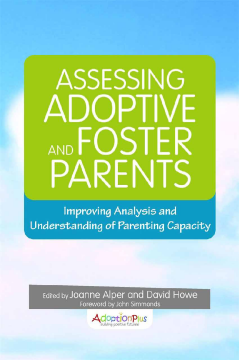
BOOK
Assessing Adoptive and Foster Parents
David Howe | Joanne Alper | Dr John Simmonds | Kim Golding | Daniel Hughes | Ben Gurney-Smith | Jon Baylin
(2015)
Additional Information
Book Details
Abstract
Assessing prospective adoptive and foster parents is an extremely complex task, and one that happens within a pressurised time frame.
Currently, assessments draw substantially on interviews with prospective adopters and foster carers. Too often, they generate a lot of information but lack meaningful analysis and understanding of parenting capacity. Children with histories of trauma, loss and hurt need to join families in which parents exhibit the ability to be good at relationships, able to manage their own stress and bond with the child in their care. In this book, leading experts including Dan Hughes, Jonathan Baylin, Kim Golding and Julie Selwyn combine the latest findings from neuroscience with research on what makes good assessments. Together, they provide guidance and recommend tools for making thorough, analytical and effective assessments which will ensure the best possible chance of placement success.
Assessing Adoptive and Foster Parents is an invaluable source of knowledge and practice guidance for social workers undertaking assessments of parenting capacity of children who have experienced neglect or trauma.
This fascinating book makes an important contribution to our understanding of the effects of development and trauma in potential adoptive parenting relationships, and describes how, and why, we need to use this understanding to inform the assessment process of those wanting to adopt.
Peter Stevens, Manager, North London Adoption & Fostering Consortium
Assessing Adoptive and Foster Parents sheds light on some of the dilemmas social workers face in assessing suitability of carers/adopters and helps deepen their understanding of the process of assessment and analysis by focussing on some of the key skills needed.
It delves into the two-way relationship between assessors and foster carers/prospective adopters, the power dynamics and how reflective functioning can be improved with practice. It also provides the assessing social worker with examples of the kinds of questions to ask in order to assess suitability and parenting potential of applicants and how the answers can then be analysed.
This book is one that must be read by anyone undertaking adoption and fostering assessments as it offers valuable knowledge, guidance and direction on how to understand and achieve analysis within assessments. A highly recommended book!
Ruby Shah, Adoption Team Coordinator, Family Placement Services, Staffordshire County Council and Lee Pardy-Mclaughlin, Principal Child and Family Social Worker, Staffordshire County Council
A visit some years ago to Adoptionplus and discussions with Joanne Alper helped open my layman's eyes to the challenge of adopting older children, children much more likely to have experienced considerable neglect. This book examines the way we assess adopters to ensure we recruit those who, however naive they might have been when first considering adoption, have the necessary qualities to succeed in raising a child damaged by the neglect of those from whom love and stability was expected. We know that those qualities - according to Rushton - include warmth, consistency, flexibility, tenacity and a sense of humour. The challenge is how to identify those characteristics and move away from a parental assessment process which has sometimes been both extremely time consuming and yet superficial and sometimes arbitrary.
But this book is also a reminder that adopters, however rich they are in the qualities which are needed, must have support. The pioneering Adoptionplus model which guarantees access to therapeutic support until the adopted child is eighteen must become the dominant adoption model in England. In the past too many courageous adopters of traumatised children have struggled, often been left isolated, and sometimes been themselves criticised for their failure as parents when, in truth, the challenges facing them would have overwhelmed most of us.
I warmly recommend this collection of illuminating essays.
Sir Martin Narey, Chair of the Adoption Leadership Board and government advisor on adoption
Assessing Adoptive and Foster Parents is a fantastic, practical and easy-to-read resource for social workers in adoption and fostering services. It brings together the most influential academics; translating theory into practice for busy social workers charged with finding families for our most vulnerable children.
Sarah Carter, Adoption Service Manager, Essex County Council
There could not be any more significant professional task than to assess and then make a prediction of what is likely to happen if prospective carers are approved and then have a child or children placed with them. As this book makes clear, it is part art and to a limited sense science...Each one of these chapters discusses in considerable detail what the current state of play is both for the art and the science of assessment.
From the foreword by John Simmonds, Director of Policy, Research and Development, British Association for Adoption and Fostering
Joanne Alper is an experienced social worker and play therapist who has worked in local authority child care social work and child protection. In 2006 she was instrumental in setting up Adoptionplus as an Adoption Support Agency and then in 2008 as a Voluntary Adoption Agency specialising in the placement of children with high level needs. Joanne is currently Director of Services at Adoptionplus. David Howe PhD is Emeritus Professor of Social Work at the University of East Anglia, Norwich. He has practised, researched and taught in the field of child and family work, including adoption, for over 40 years.
